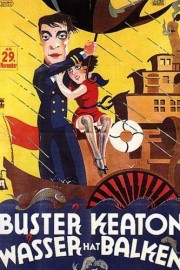Steamboat Bill Jr.
Buster Keaton specialized in simple stories. If he were around today, he probably would be doing the same, not to mention shaking his head over how convoluted some modern comedies are. However, saying that Keaton’s films focused on simple stories doesn’t mean that the movies he made were simplistic endeavors. By keeping the story simple, he allowed himself freedom to explore the several comedic possibilities each one presents, all the while telling a lovely, humane parable about life.
In “Steamboat Bill, Jr.,” the simple conceit is that of a son (played by Keaton) trying to connect with his father (Ernest Torrence). The father is a steamboat captain down South, who hasn’t seen his son since he was little. His father’s steamboat is faltering, financially speaking, with the arrival of a bigger one. However, when the son comes back, as does the rival’s daughter (Marion Byron), whom the son knows from school. They have a connection, but it is not reciprocated by the parents, whose feud is taken to a new level of rivalry just as a storm hits the town.
That’s pretty much all there is to the story; in a way, it’s a similar tale to Keaton’s great 1923 comedy, “Our Hospitality,” which was also about family rivalry that is done away with because of love. This is the first time I’ve seen it since about 2004-05, when I first really started to get into Keaton’s work, and though it’s an entertaining effort, it doesn’t quite match up with Keaton’s best films (“Sherlock Jr.,” “The General,” “Our Hospitality”). That’s not a bad thing, however, because Keaton (working with writer Carl Harbaugh and credited director, Charles Reisner) plays to his strengths, especially in a jailhouse scene with his father, a guard, and a homemade loaf of bread, as well as the storm scene, with The Great Stoneface showing off his physical gifts and staging bold stunts, including the famous one where his character narrowly escapes being crushed by the side of a house because he just happens to be standing exactly where the window is. As the silent era was coming to an end, Keaton was playing less and less ambitious with his filmmaking, and “Steamboat Bill Jr.” reflects that, but he still cared about entertaining the audience, and as always, he succeeds wonderfully here.










